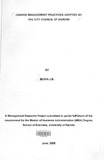| dc.description.abstract | Change is the single most important element of successful business
management and has become an accepted part of business.
Understanding and managing change are the dominant themes of
management today. The Local Government sector is not immune to the
accelerating pace of change. It is against this background that this study
was designed to establish the change management practices adopted by
the City Council of Nairobi.
The case study examined the change management practices using
Kotter's (1996) eight steps change management model. The researcher
conducted personal interviews and held group discussions with the top
management team of the Council who were involved in the change
programme. The researcher then analyzed the collected data through the
conceptual content analysis technique.
From the research findings, change in the Council is part of the wider
change taking place in the Kenya, and to some extent, globally, for the
demand of better services and accountabuity-As some respondents put it,
change at the Council was bound to happen. The change, which is still
going on, is participatory and involves the staff, government and the
private sector. The staff have been trained on change management
through workshops and seminars, while the opinion and guidance of the
both the government and private sectors have always been sought.
The study, however established that the change programme
implementation experienced some challenges. These included resistance
to change and scarce resources. Resistance was overcome through
trainings and the achievement of the "short term wins". The reforms going
on have made revenue collection more efficient hence strengthening the
resource base.
Overall, the participatory approach and conducive political environment is
making the change implementation to succeed. The researcher noted that
the change monitoring and evaluation systems being put in place will make
the changes permanent and there was no chance of the Council sliding
back to the" business as usual" status.
The Kotter model was appropriate in the evaluation of the Council change
management practices because it provides a logical and in-depth
approach to the change process. The researcher found out that the model
provided a good framework which was applicabe to the Council. However,
other models, could in future be used to evaluate the change process. | en |

